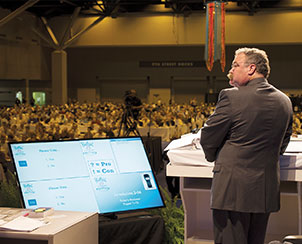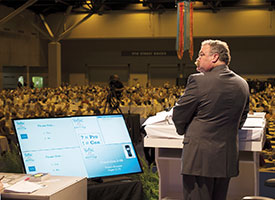By Adriane Dorr
Elected by district-convention delegates earlier this summer to his second term in office with 66.26 percent of the vote, LCMS President Rev. Dr. Matthew C. Harrison sat down with Reporter staff following the Synod’s 65th Regular Convention, July 20-25 in St. Louis, to discuss chairing his first convention and the joy a Christian has in Christ. That conversation follows.

Reporter: What were some of the most important things accomplished at this year’s convention?
Harrison: I think the biggest thing accomplished, number one, was really to have a convention that was civil and positive. I don’t know how many hundreds of people came up to me, thanked me and said they’d been at previous conventions that were such rancorous affairs and that this was totally different from anything they’d been to before. That was really important. It showed that we could discuss and debate some issues that were challenging, but I think we’ve turned a corner from debating those issues toward resolving them, even the contentious issues. We’re not there yet, but I think we’ve turned a corner.
What were the biggest surprises for you, coming out of this convention?
I expected our newbie floor-committee chairmen to do well, but some of them had very difficult issues, and I was just delighted at how well they handled very challenging things. They took a lot of input from the floor and made a lot of effort to bring parties together.
I was delighted that the Commission on Constitutional Matters (CCM) decided to suspend its opinion and, by doing that, help us work toward unity both behind the scenes and into the future. I was amazed at the preaching. I thought there was just one after another fantastic preacher. I love to be surprised by preaching and delighted by it and there was no shortage of wonderful preachers.
I thought the essayists were good, and I loved the worship services. They used the familiar orders of the church on the one hand and diverse music on the other. I just heard compliment after compliment about how enjoyable the worship was.
What parts of the convention will most affect the person in the pew?
There are many things that are significant.
Nothing is more significant than the resolution on visitation. We as a church body really need to hold each other accountable, care for one another and encourage one another. Visitation is the way to do that. That is the lynchpin for walking together as a Synod in a real way.
I hope and pray that, in many years hence, people will look back at this convention as the place in which the church, which had been divided for many decades over various issues, really began to coalesce, despite existing in a very antagonistic culture, and move forward in a very determined and united way.
What are your goals for the next triennium?
Last triennium was so intense. Our plate was filled with tasks we didn’t create or ask for, and so this triennium really has to be the teaching triennium. We have to make progress as a church body on some of the issues that have troubled us.
We have to teach, and we also have to make progress on, say, the licensed lay deacon program. My goal is to come to the next convention with a proposal [on that program] that has the backing of both seminaries and the Council of Presidents and the Commission on Theology and Church Relations, so that we can begin to move forward.
We have significant tasks ahead.
We need to evaluate the Concordia University System and how it operates so we can build on its strengths as well as strengthening its ties to the church well into the future.
We need to hold up the Global Seminary Initiative.
And we need to support the Wittenberg Project and really step up for world Lutheranism.
What should members of the LCMS be praying for in the next triennium?
Pray for your pastor. And when Jesus says, “Pray the Lord of the harvest send workers,” that starts with praying for your pastor. And pastors, pray for your people. That also includes our seminaries and our missionaries.
I would ask that people pray that the church continue to grow in strength, faith and unity and that we patiently love one another as we work through those challenges that we face internally.
People noticed and enjoyed your sense of humor at the convention. How does that joy flow from your faith?
“For freedom Christ set us free,” St. Paul says in Galatians. There is a great little book on the humor of Martin Luther by Eric W. Gritsch. He said Luther had such a great sense of humor because you know that in Christ the ultimate is sure. There’s no doubt. We have absolute certainty of salvation. Christ has accomplished it all on the cross. So if the ultimate is sure, the penultimate is no longer so deadly serious. I’m firmly convinced that God has a sense of humor because we’re created in the image of God and people have a sense of humor. My life and the life of the church are in the Lord’s hands, and there is great joy in that.
